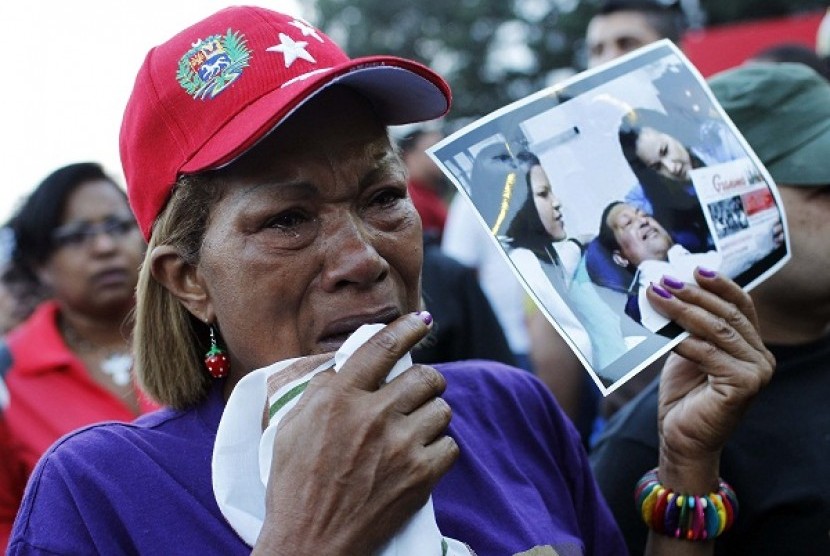REPUBLIKA.CO.ID, CARACAS - Venezuelan President Hugo Chavez died on Tuesday after his battle with cancer, ending the socialist leader's extraordinary 14-year rule of the OPEC nation.
A garrulous public speaker, Chavez was perhaps best known for his famously rambling television broadcasts that mixed serious affairs of state with songs, folksy anecdotes, quirky behavior and other antics like bashing on his infant daughter's xylophone.
His "Alo Presidente" ("Hello President") program on Sundays routinely lasted eight or nine hours or more, exhausting weary cabinet ministers sitting alongside him, as well as journalists and others required to follow it.
Here are some key facts about Chavez:
* Born to a poor family in Venezuela's plains, or "llanos," on July 28, 1954, Chavez once aspired to be a painter and then a professional baseball player in the US Major Leagues.
* His impoverished but happy childhood in rural Venezuela often were fodder for the folksy anecdotes he used when talking about politics. Combined with formidable charisma, his humble roots helped him forge a strong emotional connection with many of Venezuela's poor, who saw him almost like one of the family.
* A former lieutenant colonel, Chavez spent much of his military career conspiring with other leftist soldiers to overthrow the traditional political order.
* He led a 1992 coup against then-President Carlos Andres Perez that failed but launched his political career. A brief speech while he was being led away to jail, wearing his trademark red beret, electrified many Venezuelans and propelled him toward the presidency as a populist leader.
* After being pardoned, Chavez toured the country before winning a 1998 election. He took office early the following year. For many poor voters, he symbolized a fresh start after decades of governments widely seen as self-serving and corrupt.
* Chavez enjoyed wide backing among the poor majority partly due to massive state spending to expand health and education programs, financed by income from oil exports.
* Several times he threatened to stop oil shipments to the United States - including when he accused then-US President George W Bush of backing the 2002 coup - but never did so. The United States remains Venezuela's biggest oil export market, but Chavez also increased fuel sales to China and anti-Western states such as Belarus, Iran and Syria.
* Inspired by his friend and mentor, Cuba's Fidel Castro, Chavez took Venezuela down an increasingly radical path, nationalizing much of the economy and running the government with a micro-managing - and many said autocratic - style.
* Opponents accused Chavez of repressing critics, squandering record oil revenues and scaring away investors by seizing assets ranging from shops and farms to multibillion-dollar refinery projects run by foreign energy companies.
* Like Castro, he was known for long-winded televised speeches that often dragged late into the night. In 2012, he broke his own record by speaking for nearly 10 hours.
* Chavez was married twice. He has three daughters and a son. He and his second wife, a journalist and politician, divorced in 2000. Little is known about his private life as president, but he has often mentioned enjoying watching baseball on TV, reading, and listening to folk music from the "llanos."
* Chavez announced in mid-2011 that he was being treated for cancer.
* Chavez won re-election in October 2012 with 55 percent of the vote, but was too ill to be sworn in for his new six-year term beginning on Jan. 10. Venezuela's Supreme Court ruled that he remained president, even in the hospital.
* He flew back to Venezuela in February and went straight to a military hospital in Caracas to continue receiving treatment.
* On March 5, 2013, his vice president said he had died.


